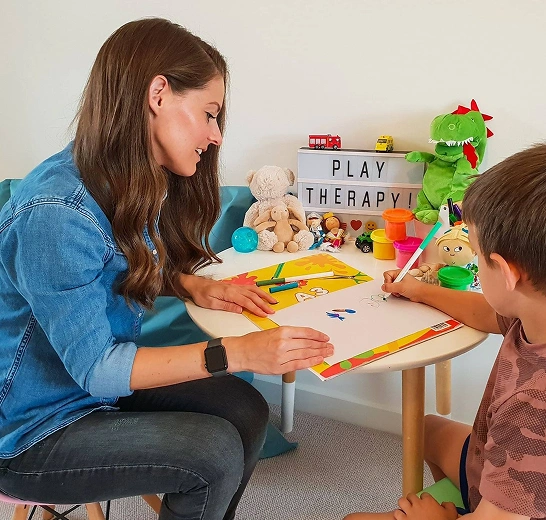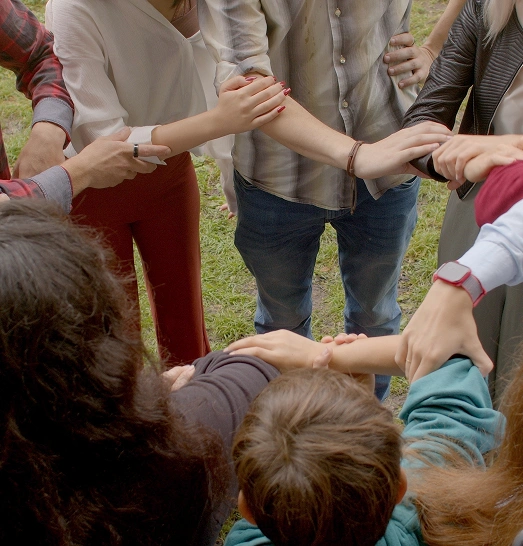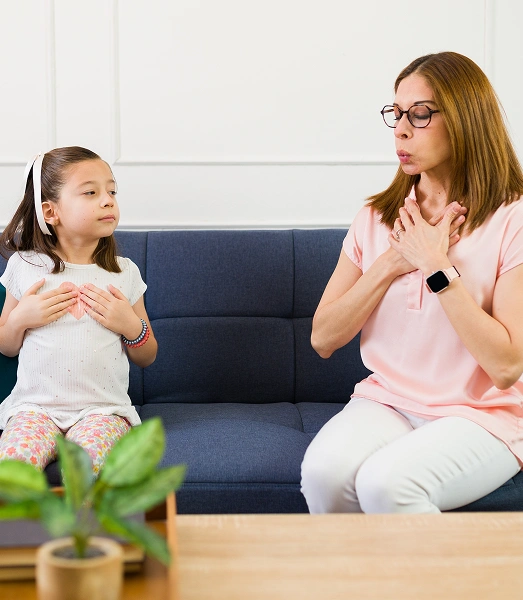At A Helping Hand Counseling Center in we offer Play Therapy to help children express emotions, build resilience, and overcome emotional and behavioral challenges. This child-focused method uses the power of play to help children process complex feelings in a safe, developmentally appropriate environment. Play therapy is a child-centered therapeutic method that uses the power of play to help children express their feelings, solve problems, and process difficult experiences in a safe and supportive environment. It is particularly effective for young children who may struggle to communicate their emotions through words alone.

With the guidance of a trained therapist, children can explore their inner world, work through challenges, and develop healthier coping strategies. Therapists use play as a natural language for children, helping them express what may be difficult to put into words. This therapy helps children:
Play therapy is a developmentally responsive form of psychotherapy that uses creative tools—such as toys, drawing, sand trays, and role-play—to help children work through trauma, anxiety, grief, or behavioral concerns. With guidance from a trained play therapist, children learn to understand and manage emotions, build coping skills, and develop positive social behaviors.

Your first therapy session is focused on understanding you and supporting your goals
Play therapy takes place in a dedicated, child-friendly space designed to make your child feel comfortable and secure. It’s a space where children can explore their feelings without judgment.
Your child’s therapist will maintain confidentiality regarding the sessions, and will share general progress updates with you as appropriate. Your child will be encouraged to build trust with their therapist, knowing that the space is one of privacy and safety.
Every child is unique, so each play therapy session is tailored to meet the specific needs of your child. The therapist will choose appropriate materials and techniques to help your child address their challenges in a way that feels natural and comfortable to them.
While your child is engaging in play therapy, we encourage open communication between you and the therapist. Periodic check-ins allow you to learn about your child’s progress and discuss any concerns or changes in behavior you may notice at home.
Sessions generally last 30-50 minutes and typically occur on a weekly or biweekly basis, depending on your child’s needs. The length of therapy varies from child to child - some may benefit from just a few sessions, while others may require more time.



Your first therapy session is focused on understanding you and supporting your goals
Your involvement is essential to your child’s success in therapy. The therapist may ask you to provide background information about your child’s history, family dynamics, and any specific concerns you may have. This helps tailor the therapy to your child’s needs.
Play therapy is a gradual process, and while it can lead to profound changes, these changes take time. We ask for your patience and trust in the therapeutic process. Avoid pressuring your child to talk about what happens during the sessions, as this can disrupt the therapeutic relationship.
Regular communication with the therapist is encouraged. If you notice changes in your child’s behavior, emotions, or interactions at home, let the therapist know. Any information you provide can help adjust the approach to best support your child’s growth.
Play therapy often helps children begin to express their emotions more freely. At home, you can support this by encouraging your child to share their feelings and thoughts and by using the strategies or suggestions provided by the therapist to continue the work outside of sessions.
Successful therapy requires consistency. It’s important to attend scheduled sessions regularly and to actively engage in the process both in the office and at home.




Family counseling is helpful when navigating:

Our therapists use evidence-based family systems techniques, integrating structural family therapy, solution-focused therapy, and communication skills training. We focus on helping your family understand each other better, rebuild trust, and respond to challenges in healthier, more supportive ways.

At AHHCC, located in St Cloud, FL, our trained therapists use evidence-based play therapy techniques to help children overcome challenges and achieve emotional well-being. We believe in the power of play as a healing tool and are committed to providing a supportive, child-centered environment where your child can thrive. If you are interested in learning more about how play therapy can benefit your child, we invite you to contact us for a consultation. Together, we can help your child build the emotional skills they need to grow, heal, and succeed.

a helping hand, mental health, health, assistance, donate, services, therapy, behavior, psychiatry, mental health professional, substance abuse, couples therapy, insurance, nursing, anxiety, mental disorder, stress, marriage, grief, anger, anger management, community, clinic, parent, suicide prevention, psychology, physician, experience, family, helping, website, mental, mental health crisis, addiction, abuse, therapists, language, play based therapy near me, playgroup therapy
depression therapy st cloud mn, mental health therapy near me, family conflict resolution therapy st cloud, a helping hand, therapy for panic st cloud, a helping hand counseling center, therapy near me, helping hands st cloud fl, a helping hand counseling, therapy st cloud fl, cognitive behavioral therapy st cloud, emdr therapy st cloud, therapy for panic attacks st cloud, child therapy st cloud